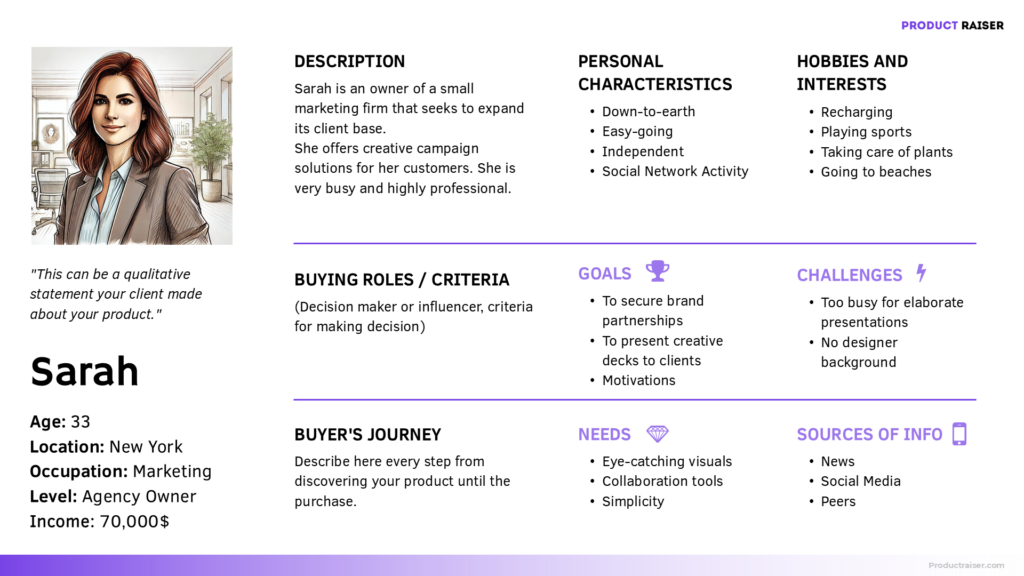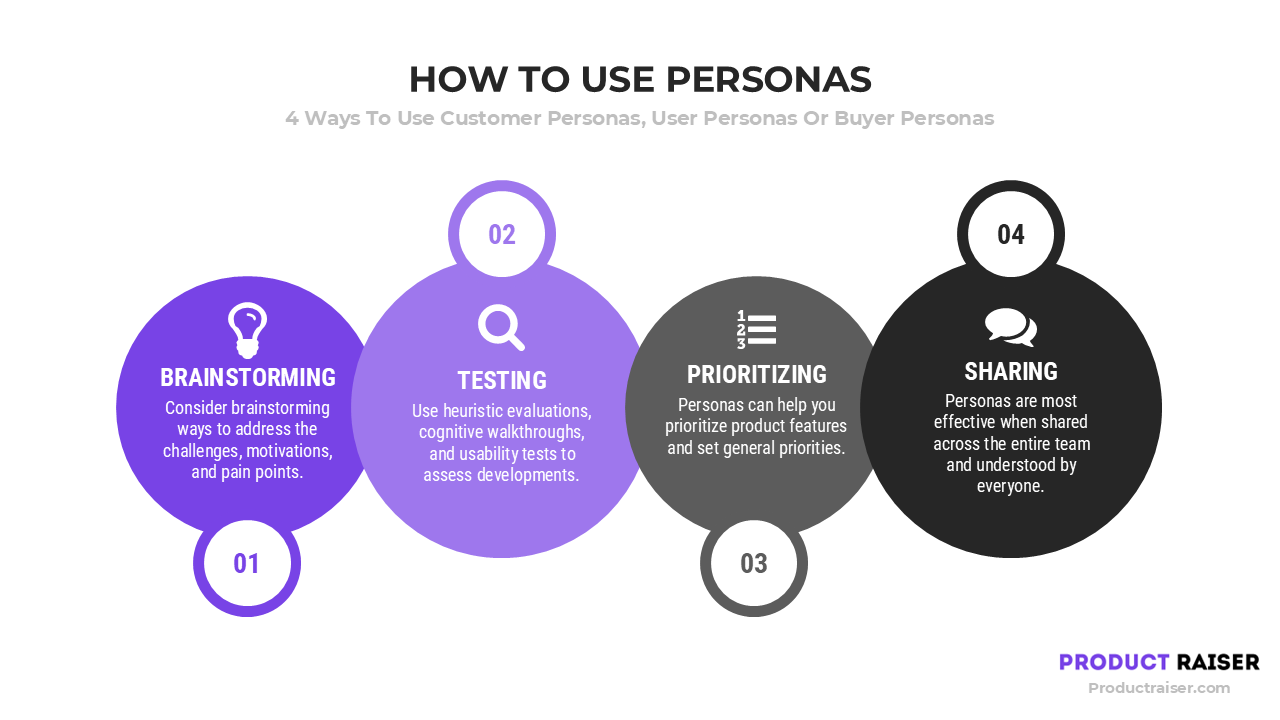Home
Use Personas and make better decisions with it (With User Persona Example)
Learn how to turn your customer personas into actionable insights that improve your product development and marketing strategies.
CHRISTIAN CASSISI – 09/30/2024

Product Management team working on customer experience with a persona /Pexels.com/ fauxels
What is a Persona?
Before we start working with Personas we need to understand what a persona is and what’s the goal behind them. Customer personas, user personas, and buyer personas are all fictional, data-driven representations of your ideal customers, but they focus on slightly different aspects of the customer journey. Understanding their distinctions helps ensure you’re using personas effectively across various stages of your product development and marketing processes.
Key information that a persona should include:
- Demographics (e.g., age, gender, job)
- Goals and motivations
- Challenges and pain points
- Buying behavior and patterns
To simplify the explanations imagine we are selling a software for small marketing agencies, helping them to organize and manage their clients projects.
A Customer Persona Example: Meet Sarah
When building a customer persona, there are a few key aspects you should focus on to make sure the persona is as useful as possible:

1. Demographics: Details like age, location, and occupation help you understand who the persona is and their background. For example, Sarah is a 33-year-old marketing agency owner in New York, which tells us she’s busy, entrepreneurial, and probably managing multiple projects at once.
2. Goals and Challenges: Knowing what your persona wants to achieve and what’s stopping them is critical. Sarah’s goals include securing brand partnerships, but her challenge is being too busy for elaborate presentations. This helps you align your product features and messaging to solve these specific problems.
3.Needs and Buying Roles: What does Sarah need from your product? For Sarah, it’s simplicity, collaboration tools, and eye-catching visuals—features that would make her life easier. Understanding her buying role as a decision-maker or influencer helps you position your product directly to someone with purchasing power.
Downloadable Template:
Download our free customer persona template to create detailed profiles like Sarah’s. Use this template to gather key info like demographics, goals, and challenges, and see how user persona examples can improve your product decisions.
How to Use Personas (Hands-on Tips and Guides)
There are probably unlimited ways to work with personas, but we broke down our 4 most important ways to work with a customer persona, user persona or buyer persona:

1.Brainstorm Solutions Around Persona Needs
Once your personas are defined, the next step is to think about how to solve their problems. Consider brainstorming ways to address the challenges, motivations, and pain points of each persona. For example, if one of your personas is Sarah, a small business owner who values simplicity, your product team might focus on designing a streamlined, easy-to-use interface that saves time.
Concrete Example: When brainstorming new features for Sarah, you might decide to remove unnecessary steps in a process, ensuring she can complete tasks with fewer clicks. You could also add time-saving shortcuts specifically for common tasks that small business owners like Sarah need.
2. Testing and Feedback: Usability Tests and Heuristic Evaluations
Use heuristic evaluations, cognitive walkthroughs, and usability tests to assess whether the solutions you’ve developed are actually user-friendly for your personas. This helps ensure that your personas can easily use the product and meet their goals with it. Run usability tests where participants are asked to complete tasks as if they were one of your personas. This gives real feedback on whether your product decisions are truly aligned with persona needs.
Concrete Example: Test your streamlined interface with users who fit Sarah’s profile. Observe how they complete tasks and ask for their feedback. Is the product as easy to use as expected? Are there any roadblocks in the process?
3. Use Personas to Prioritize Features
Personas can also help you prioritize product features. Not every feature will be equally important to all personas. Use your personas to decide which features should come first based on the size and value of the customer segment they represent. If Sarah represents the majority of your users, then features that improve efficiency and simplicity should be your top priority.
Concrete Example: If your development team has limited time and resources, focus on features that improve Sarah’s experience first, such as a simplified dashboard.
4. Collaborate with Teams by Sharing Personas
Personas are most effective when shared across the entire team and with stakeholders. Make sure that everyone—from designers to developers to marketers—understands the personas and uses them to make aligned decisions. This ensures that the entire organization is focused on creating a product that satisfies the real needs of its users.
Concrete Example: Hold a persona workshop where each team member is introduced to the key personas and can brainstorm how their specific role impacts the user experience for those personas. Marketers may tweak messaging for Sarah, while developers might think of ways to improve customization for another persona in their their mind.
Start Using Your Persona Today
Now that you understand what customer, user, and buyer personas are, and how to create and use them, you’re ready to take the next step. Personas help you make smarter decisions in product development, marketing, and beyond. The most important thing is to start using them.
At first, it might seem tricky, and nobody gets it perfect right away. But the more you work with personas, the clearer it becomes how to get the most value from them. So, take action, build your personas, and let them guide your product and marketing strategies to success.
Ready to work with your own customer personas? Subscribe to our newsletter for templates, expert tips, and the latest tools to help you get started!
Newsletter
MORE TIPS, TEMPLATES AND EXCLUSIVE INSIGHTS
Stay Ahead Of Others With Our Newest Articles
Best Product Ideation Frameworks and Processes
Learn key steps, agile techniques, and frameworks to master product ideation with real-life examples and best practices!
10 Essential Product Market Fit Survey Questions
Discover essential survey questions to understand customer pain points and validate product-market fit for your product.
Feature Adoption Rate | Benchmark & Case Studies
Discover what a good feature adoption rate is, how to measure it, and benchmarks to target. Learn the formula and examples from top companies.
Enhance A/B Testing Accuracy with Re-Randomization for Product Management
Boost A/B test accuracy in product management with re-randomization., Reduce bias, and gain reliable insights for data-driven decisions.
16 Key Activities to Validate Product-Market Fit During MVP-Phase
Discover key activities to validate product-market fit during MVP. Learn hands-on strategies to refine your product, meet user needs, and drive growth.
Top 10 Best Product Management Books for PMs
Learn how to optimize listings, gain reviews, and boost sales on Amazon in 2024.






